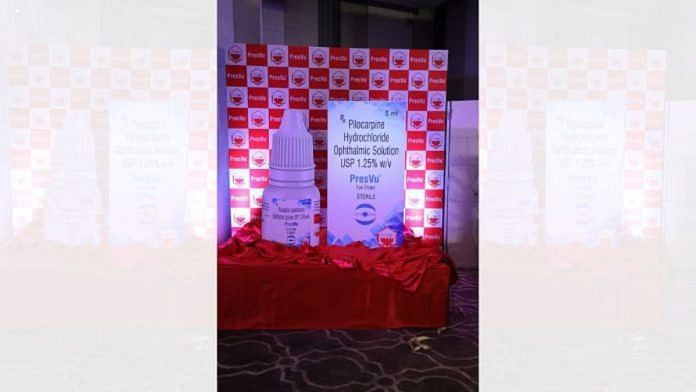As a result, most ophthalmologists now prefer safer alternatives for these conditions.
Presbyopia is a common age-related vision condition that causes the eyes to gradually lose their ability to focus on nearby objects. It typically hits people after 40 years of age. Entod Pharmaceuticals had earlier announced that the eye drops will be best suited for those aged 40-55 years.
Sources in the Central Drugs Standard Control Organisation (CDSCO) said last year—following a media blitzkrieg that created a hype around the eye drops—was revoked in the first week of April on certain “conditions”.
“The company has been asked to desist from any form of publicity involving media that creates unnecessary hype around the eye drop among general masses,” a senior CDSCO official who did not wish to be identified told ThePrint.
He, however, maintained that the drug, as is the case with other medicines, can be promoted among specialist doctors.
“Over-the-counter sale of most drugs in India is a widespread concern even though almost every medicine should legally only be sold at doctor’s prescription. The idea now is to prevent creating a buzz around the drug that may lead people to pick the eye drop at pharmacies and use it indiscriminately,” the official also said.
Following the revocation of the suspension order, a subject expert committee of the CDSCO on ophthalmology, on 16 April, also approved the phase IV clinical trial protocol for the drug, show documents seen by ThePrint. A phase IV clinical trial, also known as a post-marketing surveillance trial, is conducted after a drug or treatment has been approved and is available in the market.
ThePrint reached Drug Controller General of India (DCGI) Rajeev Singh Raghuvanshi, who heads the CDSCO, and Nikkhil K. Masurkar, chief executive officer of Entod Pharmaceuticals, via calls for comment. This report will be updated if and when their responses are received.
In the suspension order issued last September, the DCGI had said that the company violated the condition of marketing permission issued for the product and falsely projected it as a replacement for reading glasses.
The unauthorised promotion of the eye drops in the press and social media had raised doubts about them being used by patients, and safety concerns for the public, the DCGI had also said, adding that the promotion had raised concerns about its use as an over-the-counter drug when it was approved as a prescription-only drug.
This was the first ever case of a drug’s marketing authorisation getting suspended in India due to its advertising campaign.
Pilocarpine is known to shrink the size of the pupil and a similar drug, sold under the brand name Vuity by Dublin-based pharmaceutical firm Allergan, an AbbeVie company, was approved by the US Food and Drug Administration (US FDA) in 2021.
Available evidence however shows the drug is not widely prescribed by ophthalmologists there.
Last year, the All India Ophthalmological Society (AIOS)—the top network of eye doctors across the country—had also expressed apprehension about the drug’s “inappropriate marketing” and possible “indiscriminate use”,
A senior Delhi-based ophthalmologist who did not wish to be named said pilocarpine-induced miosis or contraction of pupils begins 15 to 30 minutes after application and lasts for 4-8 hours, and hence, a single dose every morning will not last all day.
Then patients with lenticular opacities—irregularity in ordered arrangement of lens fibres necessary to maintain lens transparency—caused by the degeneration of lens fibres, will have decreased vision in dim light.
“In addition, there can be changes in distance vision due to fluctuating myopic shifts in refraction (increase in myopia or near-sightedness) and hence, it needs to be carefully examined whether an improvement in near vision comes at the cost of compromised distance vision,” said the eye doctor.
Dr Sreeni Edakhlon, a senior member of the AIOS managing committee, also said that there is a risk of cataract, complications during cataract surgery in those needing it, and retinal detachment, a serious eye condition, in long term pilocarpine users.
“Therefore, the drug even if used by some people should be used only under strong and regular supervision of an ophthalmologist,” Edakhlon said, adding that the AIOS will likely study the development before deciding whether to make a formal statement in this regard.
(Edited by Gitanjali Das)








